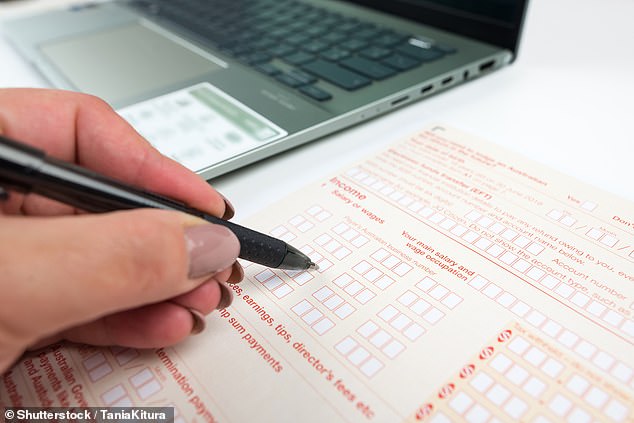Expert Unveils the Costly Tax Time Blunder Aussies Must Avoid
- Accountants caution against hastily filing tax returns by July 1
- READ MORE: The tax deductions that could get you in BIG trouble
New Zealanders who hurry to submit their tax returns prematurely are being cautioned against doing so by a leading accounting body.
With the close of the fiscal year approaching, individuals earning an income may be eligible to deduct up to $300 in employment-related costs, not including travel expenses, without having to provide proof of purchase.
Doing manual claims for work-related costs can be quite tedious, and numerous Australians feel pressured to file their returns promptly come July 1st just to secure a speedy tax refund. This way, they have funds available to cover outstanding bills.
However, Jenny Wong, the tax leader at CPA Australia – which represents Certified Practising Accountants – pointed out that individuals who hastily completed their tax returns might have overlooked significant deductions.
' Cost of living Pressures might imply that certain individuals are keen to file their tax returns promptly to receive a refund. However, it's crucial to remain patient, collect all necessary documentation, and ensure you claim every entitlement,' she stated.
'Shooting off the starter pistol prematurely on your tax return might come back to bite you. Overlooking claims you're eligible for can result in receiving less money back than you potentially could.'
It's now high time to gather all those receipts to avoid complications down the line.
"Here’s hoping your receipts aren’t tucked away at the back of the couch, but they could likely be lurking in your emails or within some phone applications. It's also possible they ended up in the cluttered drawer," Ms Wong stated.

Travel expenses
Ms Wong said those filing their tax return too early were more likely to miss out on travel expenses incurred on the job.
'She mentioned that perhaps you traveled more frequently for business purposes and weren’t compensated by your employer for meals or other necessary expenses related to travel.'
While it's possible to make a total claim on tax if the deductions are less than $300, this shortcut doesn't cover travel allowance, meal allowances, or the use of a car.
That means workers whose employer gives them a travel allowance, also known as an award transport payment, can also make a claim if travelling for work still left them out of pocket after a workplace allowance.
Ms Wong mentioned that 'any personal expenses incurred for work might qualify as tax deductions, provided you have supporting documentation should you face an audit. Reflect on the items you bought specifically for your job duties. Reviewing your bank statements would also help.'
People who use their cars should also determine which trips are for work purposes.
Ms Wong stated that for car-related costs, you need to clearly specify and explain the portion of usage that qualifies as business.
'Precisely speaking, you must utilize a logbook or diary to differentiate between personal and business trips for your claims.'

Buying new work tools
Hurrying up your tax return might risk claiming expenses for work-related items.
People who work from home can deduct the expense for a desk or a chair valued at up to $300 within one fiscal year.
Should the item exceed $300 in value, you may claim taxes on it over multiple years, depending on its expected lifespan.
The same $300 rule applies when purchasing tools required for the task.
Ms Wong mentioned, "Perhaps you began a new role where purchasing tools, subscribing to services, or covering costs for training and security clearances was necessary."
Australians have until June 30 to buy any essential work items to be able to assert the reduction for the fiscal year 2024-25 .

Working from home claim
Those working from home can multiply by 70 cents the number of hours they worked from where they lived in 2024-25. This method also requires daily diary keeping.
H&R Block determined that the average Australian working remotely would Claim 1,095 hours for the fiscal year. adding up to $767.
Alternatively, they could opt for the actual cost method, which involves tallying up their electricity and internet bills.
'Ms Wong mentioned which type of work-from-home expenses might suit you better – whether it’s the fixed rate or the actual cost method. If you’ve diligently kept track of your receipts over the year, then the actual cost approach could prove more advantageous,' she explained.
Tell the truth
People who falsify claims for their work-related costs have a higher chance of being audited by the Australian Taxation Office.
'Ms Wong stated that ensuring the accuracy of your tax return falls squarely on you.'
This involves disclosing all earnings and deducting the relevant costs.
'Failure to properly declare your income increases your chances of being audited by the ATO.'
Read more
Post a Comment for "Expert Unveils the Costly Tax Time Blunder Aussies Must Avoid"